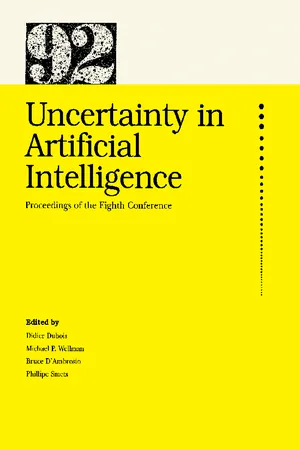
Uncertainty in Artificial Intelligence
Proceedings of the Eighth Conference (1992), July 17–19, 1992, Eighth Conference on Uncertainty in Artificial Intelligence, Stanford University
- 378 pages
- English
- PDF
- Only available on web
Uncertainty in Artificial Intelligence
Proceedings of the Eighth Conference (1992), July 17–19, 1992, Eighth Conference on Uncertainty in Artificial Intelligence, Stanford University
About This Book
Uncertainty in Artificial Intelligence: Proceedings of the Eighth Conference (1992) covers the papers presented at the Eighth Conference on Uncertainty in Artificial Intelligence, held at Stanford University on July 17-19, 1992. The book focuses on the processes, methodologies, technologies, and approaches involved in artificial intelligence. The selection first offers information on Relative Evidential Support (RES), modal logics for qualitative possibility and beliefs, and optimizing causal orderings for generating DAGs from data. Discussions focus on reversal, swap, and unclique operators, modal representation of possibility, and beliefs and conditionals. The text then examines structural controllability and observability in influence diagrams, lattice-based graded logic, and dynamic network models for forecasting. The manuscript takes a look at reformulating inference problems through selective conditioning, entropy and belief networks, parallelizing probabilistic inference, and a symbolic approach to reasoning with linguistic quantifiers. The text also ponders on sidestepping the triangulation problem in Bayesian net computations; exploring localization in Bayesian networks for large expert systems; and expressing relational and temporal knowledge in visual probabilistic networks. The selection is a valuable reference for researchers interested in artificial intelligence.
Frequently asked questions
Information
Table of contents
- Front Cover
- Uncertainty in Artificial Intelligence
- Copyright Page
- Table of Contents
- Preface
- Acknowledgments
- Chapter 1. RεS—A Relative Method for Evidential Reasoning
- Chapter 2. Optimizing Causal Orderings for Generating DAGs from Data
- Chapter 3. Modal Logics for Qualitative Possibility and Beliefs
- Chapter 4. Structural Controllability and Observability in Influence Diagrams
- Chapter 5. Lattice-Based Graded Logic: A Multimodal Approach
- Chapter 6. Dynamic Network Models for Forecasting
- Chapter 7. Reformulating Inference Problems Through Selective Conditioning
- Chapter 8. Entropy and Belief Networks
- Chapter 9. Parallelizing Probabilistic Inference Some Early Explorations
- Chapter 10. Objection-Based Causal Networks
- Chapter 11. A Symbolic Approach to Reasoning with Linguistic Quantifiers
- Chapter 12. Possibilistic Assumption based Truth Maintenance System, Validation in a Data Fusion Application
- Chapter 13. An entropy-based learning algorithm of Bayesian conditional trees
- Chapter 14. Knowledge integration for conditional probability assessments
- Chapter 15. Integrating Model Construction and Evaluation
- Chapter 16. Reasoning With Qualitative Probabilities Can Be Tractable
- Chapter 17. A computational scheme for reasoning in dynamic probabilistic networks
- Chapter 18. The Dynamic of Belief in the transferable belief model and Specialization-Generalization Matrices
- Chapter 19. A NOTE ON THE MEASURE OF DISCORD
- Chapter 20. Semantics for Probabilistic Inference
- Chapter 21. Some Problems for Convex Bayesians
- Chapter 22. Bayesian Meta-Reasoning: Determining Model Adequacy from Within a Small World
- Chapter 23. The Bounded Bayesian
- Chapter 24. Representing Context-Sensitive Knowledge in a Network Formalism: A Preliminary Report
- Chapter 25. A Probabilistic Network of Predicates
- Chapter 26. Representing Heuristic Knowledge in D-S Theory
- Chapter 27. The Topological Fusion of Bayes Nets
- Chapter 28. Calculating Uncertainty Intervals From Conditional Convex Sets of Probabilities
- Chapter 29. Sensor Validation using Dynamic Belief Networks
- Chapter 30. Empirical Probabilities in Monadic Deductive Databases
- Chapter 31. aHUGIN: A System Creating Adaptive Causal Probabilistic Networks
- Chapter 32. MESA: Maximum Entropy by Simulated Annealing
- Chapter 33. Decision Methods for Adaptive Task-Sharing in Associate Systems
- Chapter 34. Modeling Uncertain Temporal Evolutions in Model-Based Diagnosis
- Chapter 35. Guess-And-Verify Heuristics for Reducing Uncertainties in Expert Classification Systems
- Chapter 36. R&D Analyst: An Interactive Approach to Normative Decision System Model Construction
- Chapter 37. Possibilistic Constraint Satisfaction Problems or "How to handle soft constraints ?"
- Chapter 38. Decision Making Using Probabilistic Inference Methods
- Chapter 39. Conditional Independence in Uncertainty Theories
- Chapter 40. The Nature of the unnormalized Beliefs encountered in the Transferable Belief Model
- Chapter 41. Intuitions about Ordered Beliefs Leading to Probabilistic Models
- Chapter 42. Expressing Relational and Temporal Knowledge in Visual Probabilistic Networks
- Chapter 43. A Fuzzy Logic Approach to Target Tracking
- Chapter 44. Towards Precision of Probabilistic Bounds Propagation
- Chapter 45. An Algorithm for Deciding if a Set of Observed Independencies Has a Causal Explanation
- Chapter 46. Generalizing Jeffrey Conditionalization
- Chapter 47. INTERVAL STRUCTURE: A Framework for Representing Uncertain Information
- Chapter 48. Exploring Localization In Bayesian Networks For Large Expert Systems
- Chapter 49. A Decision Calculus for Belief Functions in Valuation-Based Systems
- Chapter 50. Sidestepping the Triangulation Problem in Bayesian Net Computations
- Author Index